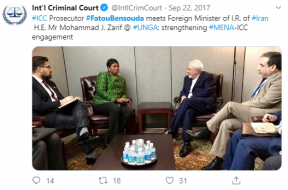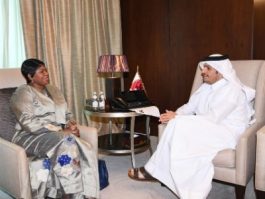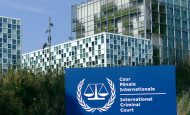Bias in ICC Prosecutor Bensouda’s Meetings and Citations
Introduction
In deciding to pursue an investigation of Israel, International Criminal Court (ICC) Prosecutor Fatou Bensouda met with a number of terror-tied organizations and groups promoting demonization campaigns targeting Israel. These non-governmental organizations (NGOs) are also cited in various ICC documents related to the investigation.
It appears that Bensouda exclusively met and replied upon groups representing the Palestinian narrative, which is reflected in the significant bias in her analysis.
Meetings with Biased Actors and Organizations
Bensouda met with the following representatives from terror-tied and/or delegitmization NGOs. There is no evidence of her office contacting or her personally meeting with any NGOs representing Israeli victims despite several groups filing materials with her office and seeking meetings with her. (See Appendix I for details about NGOs mentioned in this report.)
- In December 2019, Al-Haq “attended the eighteenth session of the Assembly of States Parties of the International Criminal Court (ICC) at the World Forum, in the Netherlands. During the week, Al-Haq made two separate and direct interventions to Prosecutor Fatou Bensouda… and engaged in meetings with staff from the Office of the Prosecutor and the Victims Outreach Unit” (emphasis added). Al-Haq official Susan Power stated, “one of our deepest concerns is the politicization in this report…we are very concerned that there is reference to a peace process and final status negotiations…these are ongoing crimes not final status negotiations…we would urge that this is the end of it and move to investigation. We urge you to open an investigation.”
- According to PCHR, in December 2019, “Lawyer Raji Sourani, Director of the Palestinian Center for Human Rights (PCHR)… delivered [a] speech[]at the annual General Assembly.” During his speech, Sourani addressed Bensouda: “we were very consistent in working with the ICC and your office, and we cooperated fully in providing full facts needed in this regard…we were able to bring you tens of witnesses over video conferences…Palestinian human rights organizations provided really significant material to your office.”
- Al-Mezan joined Al-Haq and PCHR in their “interventions” and “meetings.”
- In October 2019, Adalah participated in the “40th International for Human Rights FIDH general conference” in Taiwan. Adalah’s Facebook post notes that Bensouda also participated in the conference and “gave a presentation on justice and the ICC’s work.”
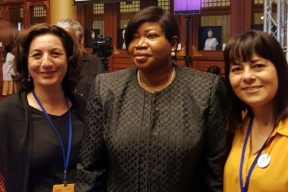
Adalah Administrative Director Fathiyya Hussein (right) with ICC Prosecutor Fatou Bensouda (Source: Adalah, October 24, 2019: https://www.facebook.com/AdalahEnglish/photos/pcb.2507766879306345/2507766549306378/?type=3&theater)
- Al Mezan also attended the FIDH conference and its director general, Issam Younis, met with Bensouda.
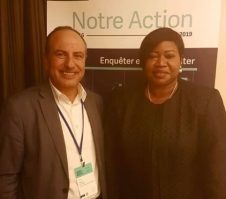
(Source: Al Mezan, “Al Mezan attends 40th FIDH Congress in Taiwan,” October 22, 2019: https://www.mezan.org/en/post/23593/Al+Mezan+attends+40th+FIDH+Congress+in+Taiwan)
- On February 19, 2019, she met with Human Rights Watch (HRW) Executive Director Ken Roth. A tweet from the official ICC account stated that civil society “continues to play and indispensable role in promoting the fight against #impunity for #atrocity crimes.” On September 26, 2019, Bensouda met with Human Rights Watch (HRW) Director of International Justice Program Richard Dicker.

HRW Executive Director Ken Roth with ICC Prosecutor Fatou Bensouda (Source: Int’l Criminal Court, February 17, 2019, Twitter: https://twitter.com/IntlCrimCourt/status/1096921158123966464)
- In September 2017, Director of Al-Haq Shawan Jabarin submitted the fourth “substantive communication” on behalf of “four Palestinian human rights organizations” to Bensouda. The “communication” alleges that “high-level Israeli civilian and military officials have committed war crimes and crimes against humanity in the occupied West Bank including East Jerusalem.”
- In November 2016, PCHR, Al Mezan, Al-Haq, and Al Dameer delivered a submission to Bensouda “Requesting Investigation and Prosecution of The Illegal Closure of the Gaza Strip.”
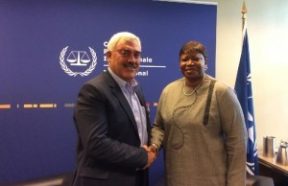
Al-Haq Director Shawan Jabarin with ICC Prosecutor Fatou Bensouda (Source: PCHR, “Investigate Persecution Arising out of Ongoing Gaza Closure, Palestinian Human Rights Organizations Urge ICC Prosecutor,” November 22, 2016: https://pchrgaza.org/en/?p=8568)
- In November 2015, Al-Haq Director Shawan Jabarin presented a “confidential communication” to Bensouda. The “communication” is authored by PCHR, Al Mezan, Al-Haq, and Al Dameer.
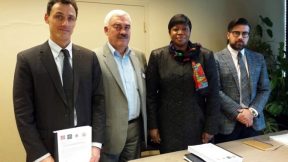
Al-Haq Director Shawan Jabarin (second from left) with ICC Prosecutor Fatou Bensouda. (Source: Al-Haq, “Palestinian Human Rights Organisations Deliver Submission to the International Criminal Court on Alleged Israeli War Crimes and Crimes against Humanity during 2014 Gaza offensive,” November 23, 2015: http://www.alhaq.org/advocacy/6460.html)
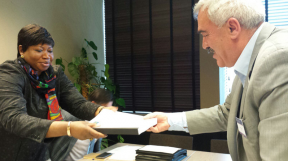
Al-Haq Director Shawan Jabarin handing ICC Prosecutor Bensouda a “confidential communication” submitted by Al-Haq, Al Mezan, Al Dameer, and PCHR. (Source: PCHR, “Palestinian Human Rights Organisations Deliver Submission to the International Criminal Court on Alleged Israeli, War Crimes and Crimes against Humanity during 2014 Gaza offensive,” November 23, 2015: https://pchrgaza.org/en/?p=1471)
- An Al-Haq press release notes that Shawan Jabarin met with Bensouda on the side-lines of the Assembly of State Parties to the ICC in December 2014.
Meetings with Repressive Regimes
Bensouda also met with a number of government officials from repressive regimes. For example, on September 22, 2017, Bensouda met with Iran’s Foreign Minister Mohammad Zarif at the UN General Assembly regarding “strengthening #MENA-ICC engagement.”
On July 9, 2017, Bensouda traveled to Qatar and met with Qatar’s Foreign Minister Sheikh Mohamed bin Abdurrahman Al-Thani. During the meeting, the two discussed “cooperation between the State of Qatar and the Office of the Prosecutor as well as the raising of awareness about international criminal justice and international humanitarian law.”
Bensouda has also met with Palestinian officials, including numerous meetings with Foreign Minister Riyad al-Maliki and President Mahmoud Abbas. Although in a January 13, 2020 interview with the Times of Israel, Bensouda states “My office has not met with any individuals identified as representing Hamas or the PFLP,” a December 30, 2019 article in the Jerusalem Post notes that the ICC met with officials from the Hamas and PFLP terror group, including “Ghazi Hammad…one of Hamas’ leaders” and “Khalida Jarrar [] represent[ing] the PFLP.” Jarrar was indicted in November 2019 of heading the PFLP in the West Bank since June 2016.
Reliance on Non-Credible, Non-Legal Sources
The ICC has also relied heavily on these NGOs in her various reports and briefs. In a number of instances, these documents uncritically repeats claims contained in non-credible UN reports that originated from these same NGOs.
Additionally, Bensouda’s December 2019 brief to the Court, seeking jurisdiction to open an investigation against Israel, relies almost exclusively on non-legally binding, highly controversial resolutions from the UN General Assembly (UNGA) and the UN Human Rights Council (UNHRC), as well as reports from the Special Committee and the UN CERIPP committee – bodies that disproportionately single out Israel and whose activities clearly meet the IHRA definition of antisemitism. Her filings completely erase the politicized context surrounding these resolutions and reports.
For example:
- The “Report on Preliminary Examination Activities 2016” notes that “staff members of certain organisations [] have gathered information of relevance to the OTP preliminary examination, such as Al-Haq and Al-Mezan Center for Human Rights…” (emphasis added).
- The 2015 “Public Redacted Version of ICC-01/13-27-Conf: Observations on behalf of victims in the proceedings for the review of the Prosecutor’s decision not to initiate an investigation” cites Human Rights Watch (HRW), Amnesty International, and FIDH claims regarding the 2010 Gaza flotilla.
- The 2015 “Application for Review pursuant to Article 53(3)(a) of the Prosecutor’s Decision of 6 November 2014 not to initiate an investigation in the Situation” cites Amnesty International’s biased report “Israel/Occupied Palestinian Territories: Israeli Inquiry into Gaza Flotilla Deaths no more than a ‘Whitewash’” that attacks Israeli investigations.
- Bensouda’s December 2019 brief cites the 2014 and 2019 UN Human Rights Council Commission of Inquiry (COI) reports. NGO Monitor research shows that both these COI reports rely heavily on biased NGOs. Additionally, these reports do not exhibit professional fact-finding standards; instead, their mandates established pre-determined legal and factual conclusions, and the commission presented “evidence” to fit the desired outcome. (See NGO Monitor’s reports on the 2014 and 2019)
- HRC Resolution 31/36 (2016) is cited twice by Prosecutor in her December 2019 brief to the court. This UN Human Rights Council resolution calls on the Office of the High Commissioner for Human Rights (OHCHR) to create a discriminatory blacklist of entities allegedly conducting activities in areas over the 1949 Armistice line. This BDS database is aimed at economically damaging companies that are owned by Jews or do business with Israel. The OHCHR closely coordinated with pro-BDS groups in compiling the blacklist.
- Bensouda’s December 2019 brief cites a number of reports written by the UN’s CEIRPP committee. CEIRPP was established by the UN in the 1970s as part of the antisemitic, discriminatory “Zionism is racism” campaign. CEIRPP regularly relies on, partners with, and hosts BDS and antisemitic NGOs.
- Bensouda’s December 2019 brief cites the 2012 “HRC Fact Finding Mission Settlements,” which notably worked from a one-sided mandate while failing to address the wider context of the Arab-Israeli context, including the systematic terror campaign against Israeli civilians. Additionally, the report almost entirely relies on political advocacy NGOs such as Adalah, Al-Haq, Amnesty International, B’Tselem, WCLAC, FIDH, Foundation for Middle East Peace, ICAHD, PCHR, Trocaire, Stop the Wall, and Who Profits.
- The ICC’s “Prosecution request pursuant to article 19(3) for a ruling on the Court’s territorial jurisdiction in Palestine,” published on December 20, 2019, cites B’Tselem five times as its source for statistics related to settlement activities. The brief also cites two reports by Al-Haq.
- Bensouda’s December 2019 brief refers to the UN-OCHA “Humanitarian Impact of Israeli Settlement Policies” December 2012 update, which in turn, cites to B’Tselem and Yesh Din claims on land allocation in the West Bank.
- Bensouda’s December 2019 brief relies on the 2016 report published by UN “Special Rapporteur on the situation of human rights in the Palestinian territories occupied since 1967” Michael Lynk. Created under UN Human Rights Council’s notorious Agenda Item 7, the mandate of this Rapporteur deliberately excludes investigation into violations by Palestinians.
- Bensouda’s December 2019 brief cites three UN General Assembly (UNGA) resolutions related to apartheid South Africa and Bantustans as a source for information on the “denial by a State of the right to self-determination of peoples.” (See UNGA Resolutions 31/6A (1976), 34/93G (1979), and 32/105N (1977)).
- As a source for condemning governments that deny the right to self-determination of peoples, including the Palestinians, Bensouda’s December 2019 brief cites to UNGA Resolution 2649 (XXV), which explicitly “Affirms the legitimacy of the struggle of peoples under colonial an alien domination recognized as being entitled to the right of self-determination to restore to themselves that right by any means at their disposal” (emphasis added). This resolution is regularly cited by groups wishing to legitimize Palestinian terrorism.
